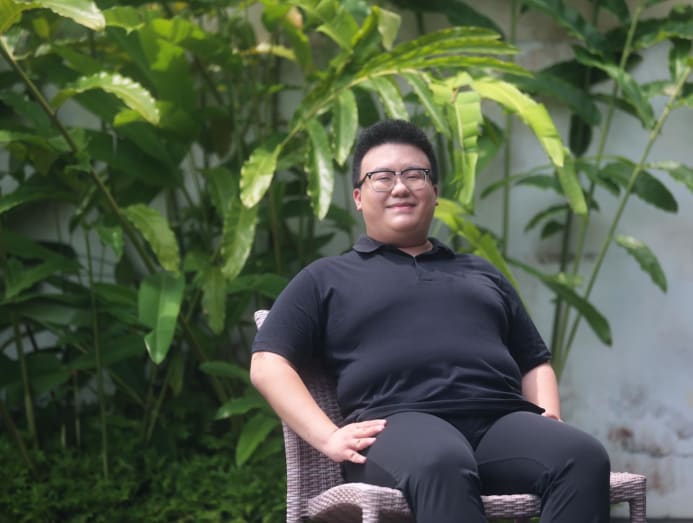Private university degrees 'less prestigious' but provide faster route to working world, say graduates

Ms Nurul Jalil (pictured) did a course with private education provider Kaplan and graduated with a bachelor of arts degree from Australia's Murdoch University.
SINGAPORE — Graduates from private education institutions are well aware of the stigma they might face while looking for a job — some employers deem their degree as "less prestigious" and tend to view them as individuals who "cannot study".
Yet they continue to pursue such degrees despite the salary gap being "slightly depressing", with around 9,100 students completing full-time bachelor's level external degree programmes across 26 private education institutions between May 2022 and April 2023.
A recent survey by government agency SkillsFuture Singapore also found that the percentage of fresh graduates from private education institutions here who found jobs within six months fell from 86.5 to 83.2 per cent between the 2021-2022 and 2022-2023 cohorts.
Graduates from such institutions also continued to earn less than their counterparts in Singapore universities such as the National University of Singapore (NUS) and Nanyang Technological University (NTU), drawing a median gross monthly salary of S$3,400 for full-time permanent employment, or around S$900 less.
TODAY spoke to three graduates from private education universities on why they decided to go down this educational route despite knowing the challenges that they would face after graduation.
THE 'STIGMA' OF A FOREIGN UNIVERSITY GRAD
For 25-year-old Alecander Ong, studying at a private university was certainly not his first choice, but he ended up doing so because his grades “weren’t the best” after graduating from Singapore Polytechnic with a grade point average of around 2.5.
“Growing up, every parent would say you have to go to a Singapore university at least.
"There was the stigma of ‘if you don’t go to a Singapore university, means you’re a bit dumb-dumb, cannot study’," Mr Ong said.
He graduated in February with a management and marketing degree at Curtin Singapore (under its parent university in Australia) after an 18-month course.
He recalled that he also felt tentative at first about telling people where he was studying when asked.
“The perception on any resume, if you see someone comes from NUS, NTU... definitely, they still get more recognition. When you say, ‘Oh, I’m from a private university', the next question people will ask is, ‘Where is that?’.”

Unlike Singapore's universities that have built up relationships with companies over the years and have an extensive database of places where NTU and NUS students may go to for internships, he said, Curtin Singapore does not have that same relationship with businesses.
So although he was given the option of doing an internship for his final trimester instead of a management module, Mr Ong had to look for an internship himself.
Knowing that finding a job may be more “strenuous and tough”, he sent out close to 50 applications on networking site Linkedin, 20 emails directly to companies and attended multiple interviews to look for an internship opportunity that could convert to full-time employment.
He managed to land an internship in a public relations firm after what he called a "very intensive" month-long search. The firm offered him a full-time role as an account executive towards the end of his internship period.
Though the reported pay gap between private institution graduates and Singapore university graduates is “slightly depressing”, Mr Ong believes that it is only a matter of time before the gap narrows in the course of one's career if one has the drive and determination.
Even though a private university degree has its limits in terms of brand recognition and campus life, Mr Ong said that the experience was beneficial because it allowed him to interact with mostly international students and instructors without needing to head overseas.
Another highlight was learning more niche subjects that may not be as common in Singaporean universities. These were modules that comprised topics on indigenous rights, sustainable development and cultural communication.
“Ultimately, it really doesn’t matter because it’s just a paper. You can also have people from NUS and private education institutions who may not be as hardworking as those with an ITE (Institute of Technical Education) certificate.
"It’s just a paper until you actively contribute and do something that proves your worth.”
THE BENEFIT OF A FLEXIBLE STUDY OPTION
Ms Nurul Jalil, 31, was brought up to believe that Singapore universities were the way to go, but a private education institution eventually became her top choice because it allowed her to balance both work and her studies.
Her search for a flexible study option led her to a bachelor of arts degree from Australia's Murdoch University, received through private education operator Kaplan. Her course was anchored on public relations and tourism and events management, which allowed her to pursue a degree “efficiently”.
“Time is super valuable to me. If I had gone with a Singapore university, it would have meant investing four long years, whereas the private education option allowed me to wrap up my double degree in just 18 months,” Ms Nurul said.
The night classes, which took place from 7pm to 10pm on weekdays, allowed her continue her full-time job as a social media manager before she graduated in 2019.
Though her family's financial circumstances led her to enter the workforce early and put her dream of studying in Australia on pause, Kaplan gave her the opportunity to have her graduation in Perth.
The private university route also appealed to her because it offered the chance to explore her diverse interests through a double major that was not available at Singapore's universities.
However, paying for her education entirely on her own was no mean feat, given the limited subsidies and financial aid available for private education candidates.
Still, Ms Nurul said that it was a "worth it" investment because she has learnt more about the tourism industry, which in turn has helped her freelance work as a food and travel blogger at Explore To Makan, a blog catered to Muslim travellers.
Her full-time job now is with technology firm Bitsmedia, where she is a search engine optimisation and content marketing specialist.
Given the practical work experience and the rigour of the course she underwent, it is disappointing even today for her to see the favouritism shown towards graduates from Singapore's autonomous universities.
Ms Nurul said that she has been deterred from applying for jobs where it is listed that the employer requires applicants to have a “minimum degree from a local university” or “recognised university” in their job descriptions.
“There’s often a perception that autonomous universities are seen as more prestigious and rigorous compared to private education institutions, which can influence employability and pay,” she added.
She also said that although university rankings and academic credentials are important, they do not guarantee a candidate’s aptitude for their job, because practical skills and hands-on experience are “equally, if not more valuable”.
“Balancing a full-time job with a part-time degree demonstrates strong time management skills,” Ms Nurul asserted.
“If an employer discriminates based solely on academic qualifications, it’s not a company I’d choose to work for.”
FASTER GRADUATION GIVES ADVANTAGE AT WORKPLACE
Unlike some of his peers, Mr Shawn Tan, 24, had a “smooth” job search experience landing a full-time position in his final trimester at private education institution PSB Academy, which he graduated from in April this year.
Holding a bachelor of science degree in cyber security, he is now a support engineer for a consultancy that makes cloud solutions. He leveraged the connections he made during his 18-month degree programme and used his industry-specific knowledge to impress future employers.
In his course, he was able to do industry-relevant modules on cybersecurity incident detection, which taught him how to use a software programme that is what he uses in his current job role.
The institution's ties with cybersecurity industry partners through guest lectures, workshops and events also helped him make connections with potential employers and get more familiar with trends in his field.

Mr Tan decided that the private education university route was best suited for him since he was more of a "hands-on" learner and it would allow him to enter the workforce faster.
As the trimester system with limited breaks provided a more intensive degree course, he found a “steady rhythm” in his studies, completing 12 modules a year instead of the eight modules most autonomous university students finish in the same time period.
Though he is aware that some private institution graduates may take a longer time to attain full-time employment in the field of their choice as compared to Singapore university graduates, he said that private university graduates enter the workforce earlier.
“By the time our autonomous university peers complete their degree programmes, we private university grads would have gained a substantial amount of work experience by at least one year even if the initial securing of a job for some people takes a little longer,” Mr Tan added.
Another plus point of his course was the diversity of his cohort.
“I had the opportunity to collaborate with peers from diverse backgrounds, including those of different ages, professional experiences and nationalities.
"It was different from my time at polytechnic. Whenever I faced challenges with assignments, my classmates were always willing to help, creating a collaborative and supportive learning environment."








